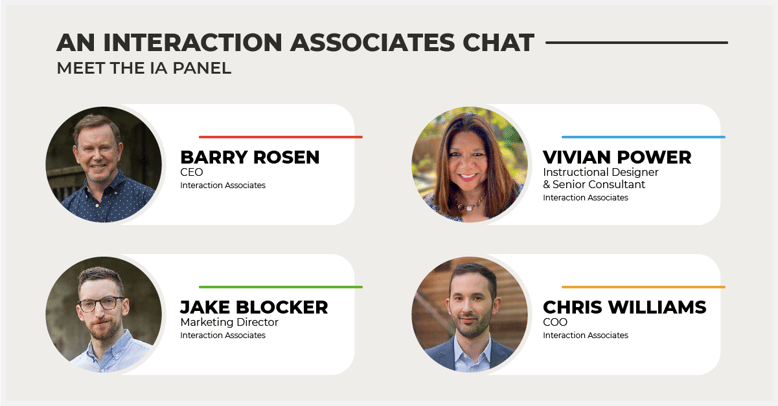IA Insights > Blog
Tips for End of Year Reviews & Goal Setting
Tips for End of Year Reviews & Goal Setting
In this edition of Interaction Associates Chat, a group of IA leaders got together on a Microsoft Teams chat to discuss best practices around end of year conversations between managers and direct reports. In this discussion, we provide actionable tips and strategies for approaching these crucial conversations. Below is the lightly edited transcript of that discussion.

Moderator: Many new managers (and even many seasoned managers) might be feeling anxious going into these year-end conversations, what advice would you give them to feel more confident and prepared?
Barry Rosen: As manager, your main job is to help your direct reports to succeed. That starts, earlier in the year, with being clear about what good performance looks like – metrics and qualitative behavior.
If you have done that, the best approach is to first let the employee tell you about how they are doing.
Vivian Power: Yes, remembering what the expectations were at the beginning of the year is important.
I believe the challenge of coming back into a hybrid workforce where some people are remote, some in person and some in both scenarios, managers may be out of practice giving feedback and having performance conversations. Acknowledging that is important.
Jake Blocker: Good point, Vivian. I feel like this has added a new layer of difficulty for leaders.
I encourage managers to take this time seriously. It shouldn't be an after-thought. Many employees will use this time as a determination on if they need to explore new options in the new year. Take the time to fully think through what you want to get out of your EOY (end of year) conversation.
Additionally, conversations are TWO-WAY. It shouldn't be a manager speaking AT their employee.
Chris Williams: The end of year should be focused on helping to grow talent and to highlight where people have gone above and beyond. It is important to acknowledge success. Don't put too much stress on getting the conversation right - focus on writing down your thoughts in advance and coming in with a development/coaching mindset (versus strictly evaluation focused).
Ask the employee where they believe their biggest accomplishment lie and where they believe they fell short.
Finally, any formal evaluation needs to tie to the goals and criteria established at the beginning of the year.
Jake: I like that, Chris.
Barry: The manager will feel less daunted if they go into the conversation with a clear set of desired outcomes for themselves, e.g., I will have learned 1-2 new things about what the employee believes they've done well, how they feel about their work, how they feel about our relationship, how they feel about the company, and what I (as manager) can do to serve them better.
Here’s something managers should keep in mind: We’ve found that successful feedback includes a 3:1 ratio of affirming or positive to constructive or delta feedback.
Vivian: Yes, I like what Barry has suggested and Chris’ comment about asking the employee what they feel is their biggest accomplishment. As a manager, it is also important to take the time to prepare and look at the positive contributions of the individual, team, and company and share that with them.
Barry: A clear conversational structure will increase manager's sense of ease. Free-wheeling conversations, especially with a direct report they believe is not performing up to par, is a recipe for disaster.
Moderator: All great advice, let's move right on to the next prompt. What about managers who may be facing difficult conversations this year? What advice would you provide them?
Jake: If a manager has waited until the end of the year to have a difficult conversation around performance, I'd encourage said manager to start having those conversations in the moment rather than waiting until EOY. That's my first piece of advice.
Vivian: Not to be afraid to have the difficult conversation. Everyone wants to be successful, so as a leader/manager, you can really help them get past a situation or scenario by having that conversation.
Chris: For difficult conversations where you are highlighting gaps in performance and a need for change, I’d recommend being specific and detailed about what you mean. Have examples and begin by being curious. Ask if anything is getting in the way. Realize as the manager it is your responsibility to have the difficult conversations - see yourself as a coach versus simply an evaluator. Your job as coach is to help your direct report develop - do even better - because you believe in their potential, gifts, and talent.
Vivian: Yes, and I love Chris' comment about being a coach -the intention is that there is room for development and improvement.
It is also important to provide examples that speak to the situation and behavior that is having an impact on you, the team, or the results.
Barry: If the manager thinks it will be a difficult conversation, the first question I'd have is, "why do you think it’ll be difficult?” For example, the manager may think the person will be defensive. Then I'd ask, “why do you feel that way?” Their response may be, “Oh because they think I'll criticize them.”
Generally, that happens because the employee is their own worst critic. The idea is to focus on the positive and let the numbers speak for themselves -- and have employee give their own assessment.
Like any meeting, the first few minutes (setting up for success) are very important to establish clarity and sense of "we're in this together.”
Chris: I appreciate your focus on letting the employee assess themselves, Barry. However, there are times when an employee will not mention something that is really a gap. Perhaps they aren't seeing the gap in performance, aren’t aware of the desired result, or lack a certain level of awareness. I think many of the difficult conversations can be avoided end of year if the manager is taking time to have developmental conversations throughout the year. A poor end of year evaluation should never be a surprise.
Sometimes gaps are really more about "capability" gaps than strict performance gaps where the person just chose not to do the work. That's where the shift can be made to a developmental focus and really about the future.
Vivian: Yes, I love the saying an ounce of prevention is worth a pound of intervention, so setting up for success and managing it throughout the year builds trust and clarity.
Barry: Just like in our own company, people can be more self-managing when they know, and have had some role, in developing their own performance metrics.
Jake: I like all of this; I'd also add that the manager needs to flex their listening skills in these conversations. It's important to hear them out and fully listen without immediately drawing conclusions.
Moderator: I’d like to move us to something related: Empathy. This has been a HUGE word over the last few years. What role does "empathy" play in EOY conversations?
Chris: Empathy is all about asking questions and then listening.
Vivian: Letting them know…
Chris: Understand that there have been a lot of difficult things going in people’s personal lives or professional lives - and being able to seek to understand.
Your job as manager is to be emphatic - seek to listen - then figure out how you can help.
Jake: Empathy seems so simple and complex at the same time. For me, it's understanding that life happens, external forces beyond our control happen. What we may have set as goals at the beginning of the year weren't actually realistic or even a priority by the end of the year. Understand this before going into conversations.
And echoing what you all have said, LISTEN.
Vivian: It was different when you can be together in one place, and you can see people in person and have an informal conversations and just ask them how they are doing. In the virtual/remote world, we don't know what they are dealing with. Just asking someone how they are doing and then listening is so important today.
Jake: So true, Vivian! We often forget about that in our virtual bubbles.
Chris: I agree with Vivian - having the space and adequate time is really important virtually.
Vivian: Yes, completely agree Chris - it is part of our job as a manager to be empathetic.
Jake: It really is. It may not be on your typical job description, but maybe it should be!
Barry: There are a few types of empathy. Here are two: 1. I understand your situation and appreciate the challenges you face, even I've been there (that’s emotional empathy). 2. I'm here to help. What can I do, or here's something I can do to help (and follow-through). That's compassionate empathy. That's walk the talk empathy.
Vivian: Great distinction Barry! As leaders, we have to model both types of empathy!
Barry: I really like what others are saying.
Chris: Be vulnerable as a manager as well. Don't be afraid to share some challenges in your life as well - this help you be more authentic.
Moderator: I'd also like to be empathetic about all of our time. We are busy people, so let's move right along to our last item: Career Development Goals: Let’s be honest, when we’re in our day-to-day and work gets hectic, these fall off our radar. How can managers do a better job at achieving these goals for themselves and their direct reports in 2023?
Jake: I feel like we go into a new year so optimistic. Our eyes are bigger than our stomachs (to borrow a food-related metaphor this holiday season). We think "hey, there are 12 full months! That's so much time!" Then we get into the weeds of the year and realize time is so very short. So, my first tip is "be realistic."
Vivian: So true, Jake . . . thinking about my own or others' development aren't top of mind, so it is important to build these conversations into your 1:1s; best practice I've shared is to at least to have a development conversation quarterly!
Chris: This is a great question. I think this all comes down to making clear goals and having the discipline to make it a priority. One way of achieving success in this area is to encourage your direct reports to spend 1-2 hours a week (really minimal time when you consider) solely focused on their career development goals. Also, set a reminder for yourself each month to revisit your goals and take an honest assessment - how are you doing towards your goals, how is your direct report doing towards their goal? Is something on the calendar? Is there a meeting you can set up to make progress towards the goal? Sometimes we just need to time block and make it a priority. This makes things happen.
Jake: Chris, I had the same tip around setting reminders. It's advice I'm also giving myself for next year. It seems unnecessary right now, but the year will fly by and before we know it, it's November and we don't remember the career development goals we set.
Vivian: And, not to wait until the end of year during the performance review conversation.
Barry: Three types of development goals: 1. how do I get better at my job? 2. how do I better express myself/realize my potential. 3. What's next on my career path, why, and how do I get there. Manager asks questions of themself and then has better ability to ask and help direct report to achieve.
Let's practice ourselves as we go into the end of the year!
Chris: The employee should lead with the career goal development. The manager is the coach that often can see the potential or opportunities the employee may not see. As a manager, come into a planning conversation with some ideas and thoughts for your employee.
Vivian: Yes, make career development conversations a practice and look at development goals as short-term, long-term and career aspirations. Extra bonus is tying them to where the business/company is going.
Jake: Yessssss, love that Vivian. I'd even toss in the idea that these goals you set at the beginning of the year are not set in stone. You may have an "ah-ha" moment that shifts what you originally thought for your career development. Allow yourself to pivot if it makes sense.
Barry: I hear you, Jake. HR often has job of reminding the manager to have the quarterly conversations. I want to have us all make conscious choices for ourselves at IA by creating better development process guidelines and support tools.
Vivian: I'm going to set some reminders for myself right now.
Chris: Revisiting and pivoting goals every few months is great - things change - new skills or direction are desired. Just build an agreement on what you are committing to and what's being taken off the list.
Moderator: Thank you all for your contributions today. I loved this conversation and I think people will find this timely and valuable. If you have any final thoughts, feel free to share!
Chris: As a manager there is always room for improvement. Take the time to also ask your employee: how can I do better, how can I better support you?
Be willing to flex your style to the person and make it focused on building the relationship first.
Vivian: Like we mentioned earlier about the performance conversations, career development conversations are a 2-way conversation, too!
Bringing out the best in others is a motto I live by! Thanks Jake, Barry and Chris!
Barry: Thanks everyone, until next time!
Interested in how to improve your manager-employee conversations? Take a look at our popular program, Managing with Impact. This training was created to help new and upcoming managers build key skills and confidence to take on their role as a leader and focuses around 3 main conversations: delegation, problem solving, and giving performance feedback.
About IA Team
Interaction Associates (IA) helps leaders and teams think more clearly, collaborate more effectively, and focus on what matters most to their customers, employees, and stakeholders. We provide our clients with practical methods for helping people work better together across functions, viewpoints, and geographies. Since IA introduced the concept and practice of group facilitation to the business world in 1969, hundreds of thousands of individuals have learned The Interaction Method™, a facilitated approach for building understanding and agreement so people can take informed, concerted action.





